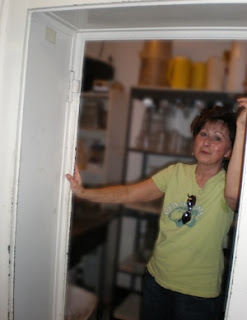 In a corner of Utah's tourist hot-spot Moab is a restaurant that has a slice of history to share. On the main street is an old little building
trying to stand out midst a bustling clutter of color. Its exterior walls are
painted hot pink. The windows and doors have bright yellow borders. Like any
peak season restaurant in a tourist town this one too has long lines of people waiting and
restaurant staff running around. Once inside, there's nothing to tell you that
this place is different from most others. It's like
any other good breakfast place serving delicious omelets and benedict. Called Jailhouse café its
tag line says, "Good enough for a last meal." They don't play Elvis
or Johnny Cash or any other prison songs. Even if
they did no one would guess what this little place has been up to. If you care to
look behind the name, it reveals a very interesting story.
In a corner of Utah's tourist hot-spot Moab is a restaurant that has a slice of history to share. On the main street is an old little building
trying to stand out midst a bustling clutter of color. Its exterior walls are
painted hot pink. The windows and doors have bright yellow borders. Like any
peak season restaurant in a tourist town this one too has long lines of people waiting and
restaurant staff running around. Once inside, there's nothing to tell you that
this place is different from most others. It's like
any other good breakfast place serving delicious omelets and benedict. Called Jailhouse café its
tag line says, "Good enough for a last meal." They don't play Elvis
or Johnny Cash or any other prison songs. Even if
they did no one would guess what this little place has been up to. If you care to
look behind the name, it reveals a very interesting story. |
| The 2 feet thick wall with iron door frames |
The building was constructed in 1885, and
when it moved hands seven years later, it served as the first county courthouse
of Grand County Utah. Adjoining the hall was an actual jail that held several
convicts of those times. The basic structure of Jailhouse café still retains
the original elements. The kitchen and the store have strong walls that are two
feet thick and the door frames are stout iron beams. The other entry doors and
windows are intact, standing as mute witnesses. If only they could talk and give
me the names of all the past inhabitants of that cell. In the intervening
years, the building has been a house, a post office, a store and a crumbling
ruin till 1992 when William Petty a connoisseur of heritage architecture and a
passionate cook decided to turn the building into a restaurant. Just before it
became today's Jailhouse café, the building suffered neglect in a severely
strained Moab's uranium-based economy.
Loretta Adkison, who manages the Jailhouse café said, "The
restaurant is only 15 years old but the building has seen so much more over the
last 124 years. All the walls and the frames are from the early days."
William Petty himself designed the menu and made all the
necessary additions to turn it around into a delightful little restaurant. Now,
behind the two-foot thick adobe walls are shelves with lines of buttermilk
pancake mix, empty vessels and other items needed for the next day's business.
The door to the actual cell could have been an interesting piece of study but
Loretta, knows nothing about it. She only laughs and rubs her elbow saying,
"The edges are so hard, I have chipped my bones on them many times."
Did the cell have among its elite guests one Mr. Butch Cassidy?
Could be, if some time is spent on collecting the details who knows what
interesting facts pour out?
This article authored by Anand Rao was originally published by our partner Utah Stories. For more local Utah stories and businesses please visit our partner www.utahstories.com.
